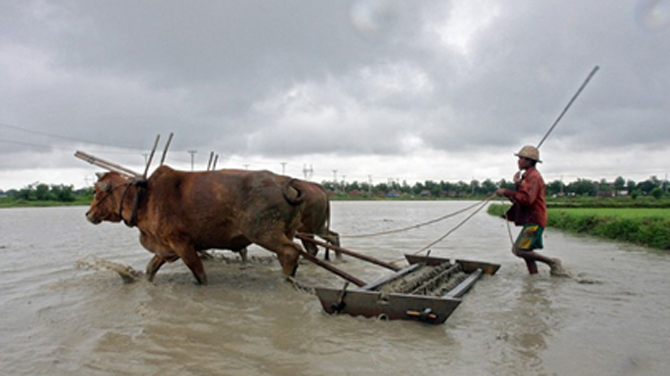Burma Farmers Fear Land Act

The process of people moving from rural agricultural subsistence to cities for work is a universal capitalist occurrence as a country develops, but for Pho Phyu the prospects for his clients don't look bright if they leave their land.
“They don't have much education and they have to take low-level work in Rangoon or in border towns, riding a trishaw or as casual laborers … the children have to work and cannot attend school.”
Economists disagree about the move to consolidate agricultural land ownership. What could be compared to a an Enclosure Act, as it was known in the first instance, in the birth of capitalism in the UK. Many contend that it will increase productivity, that the economies of scale of more commercialized farming will produce greater outputs, owing to greater inputs, such as fertilizers and mechanization.
However, for Professor Sean Turnell of Australia's Macquarie University, “It's true that what we are talking about is a liberalizing or pro-business development at one level, but because it so favors larger enterprises I worry that any efficiency gains from larger scale production could be offset by the socio- economic damage of people being implicitly or explicitly forced off their land.”
“Crops like rice, many studies seem to show, are better done on family farms in poor countries than on plantations and the like—especially given the inputs required by the latter. In a country with abundant but under-utilized rural labour, small scale production is also a significant employer.”
While the government has committed verbally to a market-oriented economy there also seems fears that the law will give explicit control over the sector to government, inducing worrying memories of the country's ignominious experiment in command economics.
“Under section 23, the president is given full authority to issue instructions over the use of land for particular purposes in any part of the country,” says the AHRC. “The past record of centralized land management and planning in Burma has been one of abject failure.”
So much so that in 1966, a mere four years after Ne Win's coup, political scientist Josef Silverstein quoted the general-turned-pseudo socialist saying, “If Burma were not a country abundant in food we would be starving.”
Indeed as the likes of the IMF herald a new economic dawn, Burma's Deputy Labour Minister Myint Thein warned that, “We have to find out how to solve the problem of rising unemployment, which is increasing in line with the population.”
The Myanmar Times quoted Myint Thein saying that of a total workforce of some 36 million around 1.22 were unemployed. This figure would naturally increase as farmers such as the ones represented by Pho Phyu are pushed off their land. One has to remember that around 6 million Burmese find work outside the country's borders.
Myint Thein further added: “We confess that the ministry alone cannot solve the rising unemployment rate.”
Unemployment is a problem for the Labour Ministry, but perhaps conversely not for the market-orientated system as a whole. For geographer Professor David Harvey in his book The Enigma of Capital, “The dispossession of the mass of the population from direct access to the means of production (land in particular) releases labour power as a commodity into the market place.”
Without what Marx termed an “industrial reserve army” (“docile, manipulable,” hungry, unemployed people) then, according to Harvey, “capital faces a serious barrier to continuous accumulation.”
Sources close to the government corroborate with Pho Phyu and the theory that the USDP fought hard to prevent farmers from being included in the otherwise progressive Labour Organization Bill, that was signed into law in October.
In other words, Burma's transition to a market-oriented economy would face a serious challenge if the majority of the population were self-sufficient, small-scale farmers who were not willing to undercut laborers elsewhere in Asia in stitching training shoes for export.
If the 70 percent of the population had a mandate and decided they would rather stay on their farms then the cost of labor in new ventures such as Dawei would be far less competitive than say, neighbouring Bangladesh.
Chief government economic adviser U Myint corroborates in a 2009 report, “It will be desirable for Myanmar to recognise that its most valuable resource is not its rich agricultural land, its forests, its mineral reserves, or its hydrocarbon deposits. It is its people.”
Pho Phyu laughs at the prospect of jail, one which he claims has been ordered by Myint Swe, the chief minister for Rangoon Division. While the Labour Act is debated by ministers, it is clear that the battle that quietly goes on for the future of the vast majority of working Burmese is far from over.
« previous 1 | 2 |
|
||
|
||
- Students Without a University
- Displaced and Distressed
- Training the Next Generation of Kachin Rebels
- Rangoon Art Show Provides Arresting Display
- Magical Mandalay Still Holds Court for Tourists
- Distrust and Displacement on Kachin Frontline
- Thein Sein: Reformist or Caretaker?
- School’s Not Out in Kachin State
- Irrawaddy Dolphins are Firm Fisherman’s Friends
- Thein Sein: Reformist or Caretaker?
